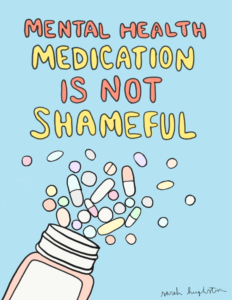The stigma around mental health medication is something I wasn’t aware of until I started taking medication.
For me, anxiety medication changed everything. But it took a long time to get there.
After a therapy session one day, my therapist brought up medication. We didn’t really talk too much about it, the idea was just brought up.
Nevertheless, I was so excited after – I practically floated out of the Counseling Center.
Here’s the thing about medication: it makes an invisible illness feel real.
Obviously, I knew my anxiety was real. I had experienced it long enough to know that it wasn’t just something I was making up.
But one of the hardest parts about mental illness is sometimes it takes a while to believe your symptoms.
To hear someone say, “I think you could use some assistance, let me help you find it” is so liberating.
I know I am one of the lucky ones. I have access to insurance, my medication is fairly common and I’m able to pay for it without too much difficulty.
It is not always like that. It should be, but it’s not.
The first medication I tried did not work for me. It made me dizzy and I often forgot my surroundings. It was honestly probably one of the worst weeks of my life.
And then I found the right medication.
At first, I didn’t notice a difference. Everything seemed back to normal, but not like my brain had dramatically changed.
Until I realized that this was what it felt like to have less anxiety. To go through a day without looking for it around every corner, to sit in peace without wondering what the worst possibilities are.
Medication helps my body calm down. It helps my brain tell me how to react to my fight or flight instinct. I am able to focus better and let go of things easier. I am able to slow down my thoughts enough to process them before deciding to act.
Let me be clear: I am able to live a better life because I have access to mental health medication.
My medication doesn’t magically make my anxiety go away. My anxiety will never fully go away, actually. But it does give my brain the chance to have moments, or sometimes even a full day, without anxiety. That, combined with therapy, gives me the opportunity to live a much calmer life.
One of the constant thoughts I had while in the process of finding medication was, “what will other people think?”
Clearly, I’ve gotten past that worry, however, it is a terrifying thought to wonder if the people in your life will judge you for something that helps you so much.
The easiest way to support someone with mental illness is to trust them when they say they have one. And then validate their desire to get better.
You wouldn’t question someone for taking medication for a chronic illness like diabetes or asthma, would you?
Mental illness is no different.
Suggesting a “natural solution” like yoga or to “chill your mind out” (I’m looking at you Jake Paul) is equally unhelpful, as sometimes my brain is chemically incapable of “chilling.”
If someone you know has told you that they’re either thinking of going on medication for mental illness or that they are already on medication, here is an appropriate response: “Thank you for trusting me enough to tell me that! I’m glad you’ve found/are trying to find a solution that works for you. If there is anything I can do to support you on this journey, please let me know. I’m so proud of you!”
Medication is not a sign of weakness.
Some people can manage their mental health without medication, some people can’t.
I can’t, and that’s okay.
